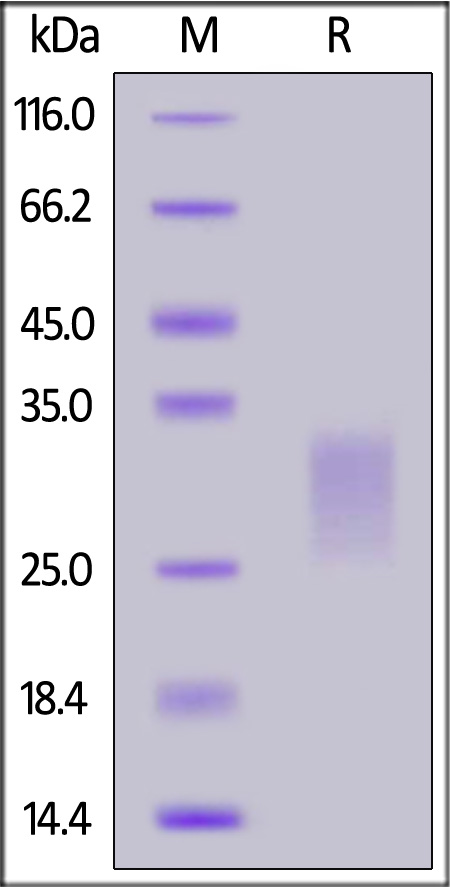分子别名(Synonym)
TSLP
表达区间及表达系统(Source)
Biotinylated Mouse TSLP, His,Avitag (TSP-M82E3) is expressed from human 293 cells (HEK293). It contains AA Tyr 20 - Glu 140 (Accession # Q9JIE6-1).
Predicted N-terminus: Tyr 20
Request for sequence
蛋白结构(Molecular Characterization)

This protein carries a polyhistidine tag at the C-terminus, followed by an Avi tag (Avitag™).
The protein has a calculated MW of 17.6 kDa. The protein migrates as 25-33 kDa under reducing (R) condition (SDS-PAGE) due to glycosylation.
标记(Biotinylation)
Biotinylation of this product is performed using Avitag™ technology. Briefly, the single lysine residue in the Avitag is enzymatically labeled with biotin.
蛋白标记度(Biotin:Protein Ratio)
Passed as determined by the HABA assay / binding ELISA.
内毒素(Endotoxin)
Less than 1.0 EU per μg by the LAL method.
纯度(Purity)
>90% as determined by SDS-PAGE.
制剂(Formulation)
Lyophilized from 0.22 μm filtered solution in PBS, pH7.4. Normally trehalose is added as protectant before lyophilization.
Contact us for customized product form or formulation.
重构方法(Reconstitution)
Please see Certificate of Analysis for specific instructions.
For best performance, we strongly recommend you to follow the reconstitution protocol provided in the CoA.
存储(Storage)
For long term storage, the product should be stored at lyophilized state at -20°C or lower.
Please avoid repeated freeze-thaw cycles.
This product is stable after storage at:
- -20°C to -70°C for 12 months in lyophilized state;
- -70°C for 3 months under sterile conditions after reconstitution.
电泳(SDS-PAGE)

Biotinylated Mouse TSLP, His,Avitag on SDS-PAGE under reducing (R) condition. The gel was stained with Coomassie Blue. The purity of the protein is greater than 90%.
背景(Background)
Thymic stromal lymphopoietin (TSLP) is an epithelial cell-derived cytokine involved in the pathology of inflammatory skin diseases, and is widely expressed by epithelial cells. Human TSLP cDNA encodes a 159 amino acid (aa) residue precursor protein with a 28 aa signal sequence (4, 5). Human TSLP has been shown to developing nondeletional central tolerance, amplifying epithelium-induced class switching, inducing atopic diseases and maintaining intestinal noninflammatory environment. Among diverse cells responding to Human TSLP, CD11c+ dendritic cells are the most obviously characterized target cells.























































 膜杰作
膜杰作 Star Staining
Star Staining













